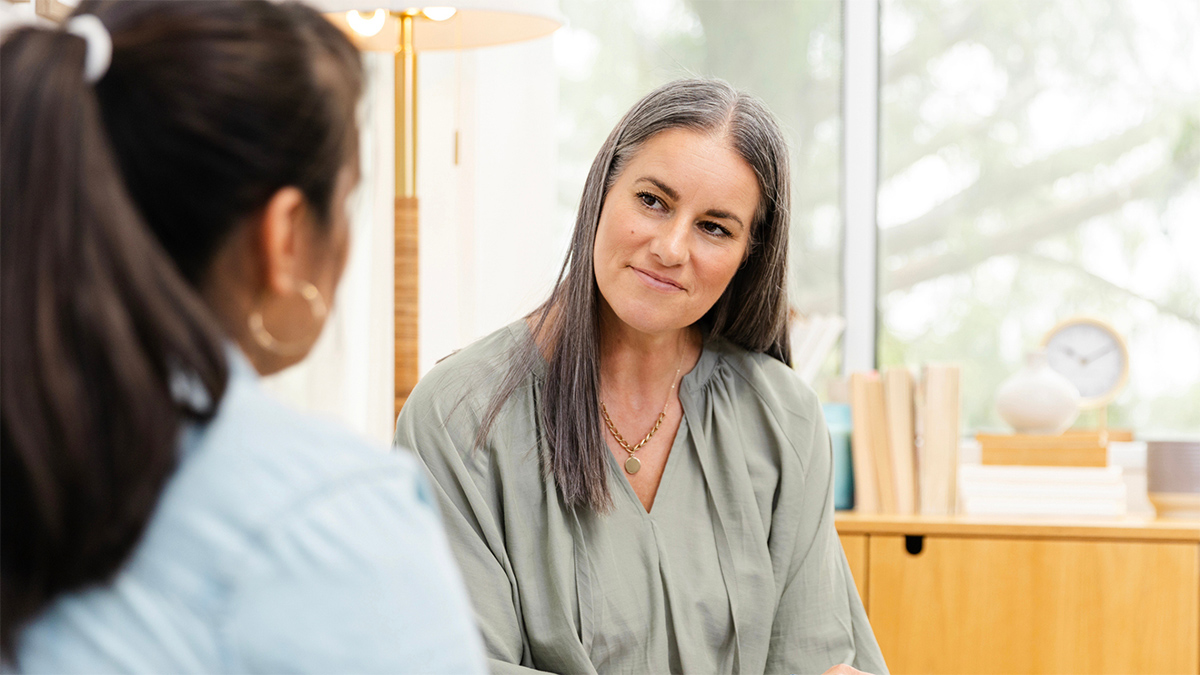
Outpatient addiction treatment provides individuals the ability to receive treatment for substance use disorder (SUD) without the need to be a patient in a clinical setting. Still, clients can remain in a safe environment designed to help them on their journey to long-term sobriety. Learn how this multi-phase treatment can be a positive, highly effective approach to addiction recovery.
Effective Three-Phase Approach to Outpatient Addiction Treatment
Outpatient care is an essential option for meeting the myriad needs of a person with a substance use disorder (SUD). It provides many of the same resources as inpatient programs, with additional flexibility, structure, and long-term support.
At Maryland Recovery, we offer three phases of outpatient care, including:
These three phases give clients the opportunity to implement healthy habits, promote abstinence from substance use, and support long-term care. Together, they provide access to the optimal outcome for any treatment program: sustained recovery.
What Is Outpatient Addiction Treatment?
It is important to note that outpatient addiction treatment differs from inpatient rehabilitation in a number of ways. Inpatient rehabilitation commences when a patient is admitted to a hospital or rehabilitation facility for residential treatment in a controlled environment. Detoxing is typically the primary focus, followed by becoming physically and mentally ready to begin the recovery process.
While outpatient care also provides a structured setting for substance use disorder treatment, individuals do not stay in the facility 24/7. Instead, individuals are able to receive treatment and then return home. However, those who have recently been in an inpatient treatment setting may benefit greatly from outpatient care.
In fact, one of the most significant benefits of outpatient treatment is that it provides flexibility for attending treatment sessions while the individual eases into a new phase of life, such as moving into a sober living environment. Even comprehensive programs typically offer customized options that incorporate detox, medication-assisted treatment (MAT), Partial Hospitalization Programs (PHP), and Intensive Outpatient Programs (IOP).
Phase 1: Partial Hospitalization Program (PHP)

A partial hospitalization program (PHP) for substance use disorder serves as a bridge between inpatient and outpatient services by providing intensive, structured treatment during the day without an overnight stay. This level of care offers a step down from the 24/7 supervision of inpatient treatment, supporting patients in transitioning to outpatient care by maintaining accountability and therapy while fostering independence.
What Is PHP?
PHP offers a middle ground between inpatient and outpatient care. Patients attend therapy and medical sessions during the day – typically five to seven days a week for several hours – but return to a sober living environment in the evenings. This structure allows individuals to maintain some independence. It provides comprehensive support, including group therapy, individual counseling, and medication management, to help stabilize patients while preparing them for less intensive outpatient treatment.
What to Expect in PHP
If you are considering PHP, you can expect to attend treatment between five and seven days each week, usually lasting between four and eight hours. Treatment typically includes intensive therapies and medical supervision that will prepare you for the next steps in your recovery. The typical PHP lasts for about four weeks, but the duration can vary depending on the program and your unique circumstances.
Key PHP Therapies
There are several types of therapies available in this phase of treatment.
Some of the most common therapies used in PHP include:
- Individual and Group Therapy – Individual sessions with a therapist, or sessions within a group setting, are one of the most common forms of therapy available during PHP. Clients can work through their issues with the help of a licensed therapist as well as the support of others going through similar journeys.
- Medication-Assisted Treatment (MAT) – Medication-assisted treatment (MAT) is an evidence-based tool used to treat substance use disorders by combining FDA-approved medications with counseling and behavioral therapies.
- Behavioral Therapies – Behavioral therapies are approved to address many mental health disorders, such as SUD, depression, anxiety, and obsessive-compulsive disorders.
- Cognitive behavioral therapy (CBT) is frequently used during SUD treatment. This therapy focuses on developing skills that can be used for abstaining from substances.
- Dialectical Behavior Therapy (DBT) is especially beneficial for those who have trouble regulating their emotions. DBT can help clients target harmful behaviors while learning techniques to implement healthier behaviors.
- Holistic Services – Holistic services are a crucial component of PHP treatment. Some of these services include yoga, mindfulness meditation, and nutrition support.
Benefits of PHP for Addiction Recovery
There are multiple advantages to PHP treatment. While it is considered more intensive than an intensive outpatient program (IOP), PHP allows for some flexibility as an overnight stay is not mandatory. This gives individuals more independence and can foster a smoother transition from inpatient care to outpatient settings while also encouraging the development of coping skills. Additionally, PHPs can be more cost-effective than full inpatient programs.
Most importantly, PHPs reduce the risk of relapse by offering consistent monitoring and accountability during a critical recovery phase.
Phase 2: Intensive Outpatient Program (IOP)

As Phase 2, Intensive Outpatient Programs (IOP) offer a step-down from Phase 1, PHP, for individuals with substance use disorder. IOPs provide a flexible yet supportive environment, focusing on relapse prevention, skill-building, and long-term recovery while requiring less time commitment than higher levels of care.
What is IOP?
IOP is designed to offer more support than typical outpatient programs but not as intensive as PHP. While there are fewer therapeutic sessions scheduled each week, there is still structured support focusing on how to avoid relapse, healthy coping skills, psychosocial support, and targeting any individual needs.
What to Expect in IOP
Typical IOP treatment occurs three to five days each week for a few hours per session. Clients can attend continued therapy and receive group support from those dealing with similar issues. These programs focus on relapse prevention while also teaching individuals new skills upon which they can build a new life based on healthy habits, positive coping mechanisms, and trigger identification and avoidance strategies.
Key IOP Therapies
IOP treatment often involves multiple therapeutic options.
Here are a few of the most common:
- Individual and Group Counseling – Individual counseling sessions are important as a means of helping the individual focus on working through mental health issues and providing them with the resources needed to remain in recovery. Group counseling is another helpful form of therapy, providing a safe space to share with others who have similar issues as well as the opportunity to build a community.
- Family Therapy – Family therapy is very important in the recovery process as it educates family members of those who are recovering from an SUD about ways to improve communication and strengthen their relationships. SAMHSA encourages family therapies as a way to help families support and sustain their loved one’s recovery.
- Trauma-Informed Care – Many who have struggled with a substance use disorder have experienced one or more traumatic events. Therapies and care structured around the understanding of how trauma can impact recovery avoid trauma triggers and re-traumatization.
- Career and life skills training – Those struggling with an SUD may need to relearn specific skills or be taught these skills for the first time to help them succeed in recovery.
IOP versus PHP: What’s the Difference?
While IOP and PHP may seem very similar, there are differences between the two. Perhaps the most significant is the amount of time involved in completing the treatment. PHPs typically involve hours more time spent in therapeutic sessions per week than IOPs. Additionally, PHP is a more intensive program and offers more structure for those who need more help working through their substance use disorder. PHPs also tend to be more heavily supervised than IOPs, with consistent access to healthcare professionals.
Phase 3: Extended Outpatient Care and Aftercare

The third and final phase of comprehensive outpatient addiction treatment is known as extended outpatient care and aftercare. For many individuals moving through the recovery process, extended outpatient care can feel very similar to life outside rehab.
What Is Extended Outpatient Care?
As the name suggests, extended outpatient care provides long-term treatment for people with substance use disorder who continue to need support as they continue their journey in recovery. In many cases, this treatment includes outpatient services provided by a treatment center, continuing therapy, support groups, and assistance with medication management.
Extended outpatient programs focus on providing the tools necessary for starting a life free from substance use and remaining in long-term recovery. This is an approach commonly used for those who have struggled with an SUD for a long time. Extended outpatient programs aim to gently ease clients into becoming fully independent. Depending on the person, most clients can complete the program within one to three weekly sessions.
Aftercare and Long-Term Recovery Planning
Many programs are available to provide continuous aftercare and assistance during long-term recovery.
Some of the most common include:
- 12-step Alternatives and Peer Support Groups – Twelve-step groups include programs such as Alcoholics Anonymous and similar alternatives, which base their journey to recovery on implementing twelve healing steps. Peer support groups are also essential as a way to secure ongoing support.
- Ongoing Mental Health Counseling – Continued therapy sessions and counseling can provide helpful resources and tools essential for achieving long-term recovery.
- Sober Living and Community Resources – A sober living residence provides a safe environment where those who are in recovery from substance use disorder can regain independence but retain access to important resources. Other community resources, such as phone helplines and housing or career counseling, are frequently highlighted for those in sober living.
- Alumni Programs – Alumni programs are a fantastic resource that brings together people at various stages of recovery. Within this network, individuals can find continual support in a safe space that is free of judgment.
How to Choose the Right Outpatient Treatment Program
The ultimate goal of any substance use disorder treatment is long-term recovery, but finding the right program for you can drastically increase your chances of success.
According to the Substance Abuse and Mental Health Services Administration (SAMHSA), it is critical to consider several factors during your search:
- Accreditation and Licensure – First, ensure that you are only considering accredited programs certified or licensed by the state.
- Science-Backed Programs – Prioritize treatments that are evidence-based, including cognitive behavior therapy and medication management.
- Family Support – Ensure that the program strives to include family members in the process, as they can be a crucial form of support for individuals with SUD.
- Continuing Care – Look for continuing care options that involve ongoing counseling, assistance with medication management, and meeting other needs, such as sober living homes.
- Customized Plans – When searching for the right treatment, it is equally important to ensure that customized treatment plans are available. As each person has unique needs, a plan customized to meet those unique needs can provide the best path to recovery. (SAMHSA, 2019)
Maryland Recovery’s evidence-based approach involves numerous services as components of our outpatient programs, including individual and group therapy, family education and treatment, relapse prevention skill-building, education to help manage cravings and identify triggers, and 12-step meetings. Personalized treatment programs that carefully select multiple services in a tailored combination can be the most effective strategy for recovery.
Maryland Recovery’s Outpatient Care Model

At Maryland Recovery, we understand the importance of providing long-term, comprehensive care that is flexible enough to meet each individual where they currently are – the basis for our three-phase approach to outpatient programming.
PHP begins the road to recovery with access to a highly structured environment and professional medical staff without committing to an overnight stay. The next phase, IOP, provides individual and group counseling sessions to help work through the root of substance use while beginning the process of easing clients back into daily life. Finally, the extended care phase completes the supervised path to recovery by providing ongoing resources and support to help clients remain in recovery.
If you or a loved one is ready to explore an outpatient addiction treatment to begin your journey to recovery, contact the compassionate staff at Maryland Recovery for more information.
Editor’s Note: This article is a combination of posts from 2014 that have been updated April 12, 2025.
Resources:
- National Research Council (US) and Institute of Medicine (US) Committee on Developing Evidence-Based Standards for Psychosocial Interventions for Mental Disorders. (2015). Psychosocial interventions for mental and substance use disorders: A framework for establishing evidence-based standards. National Academies Press (US). https://www.ncbi.nlm.nih.gov/books/NBK64088/
- National Institute for Occupational Safety and Health (NIOSH). (2019). Stress at work: Workplace solutions. Centers for Disease Control and Prevention. https://www.cdc.gov/niosh/docs/wp-solutions/2019-133/pdfs/2019-133.pdf
- Linehan, M. M. (1993). Cognitive-behavioral treatment of borderline personality disorder. Psychiatric Services, 44(3), 254–260. https://pubmed.ncbi.nlm.nih.gov/10106610/
- Yale Medicine. (n.d.). Dialectical behavior therapy (DBT). Retrieved March 27, 2025, from https://www.yalemedicine.org/conditions/dialectical-behavior-therapy-dbt#:~:text=DBT%20treatment%20involves%20teaching%20people…
- Becker, S. J., & Curry, J. F. (2008). Outpatient interventions for adolescent substance abuse: A quality of evidence review. Substance Abuse: Research and Treatment, 2, 13–28. https://www.ncbi.nlm.nih.gov/pmc/articles/PMC4152944/
- O’Neil, M. E., & Peterson, K. (2021). Treatment for co-occurring substance use disorder and mental health conditions. In Substance Use Disorders: Assessment and Treatment. Agency for Healthcare Research and Quality (US). https://www.ncbi.nlm.nih.gov/books/NBK571088/
- Laudet, A. B., & Humphreys, K. (2013). Promoting recovery in an evolving policy context: What do we know and what do we need to know about recovery support services? Journal of Psychoactive Drugs, 45(4), 310–317. https://www.tandfonline.com/doi/abs/10.1080/02791072.2013.844381
- Substance Abuse and Mental Health Services Administration (SAMHSA). (2022, July 20). Struggling with addiction? Tips for finding quality treatment. https://www.samhsa.gov/blog/struggling-addiction-tips-finding-quality-treatment

A solution focused therapist with over a decade in the helping services, I am attuned to the broad expanse of holistic recovery. My mission is inspired by the work of Joseph Campbell, Dr. Wayne Dyer, and Fr. Joseph Martin. I am well versed in the specific needs of the recovery community and am trained in EMDR.








